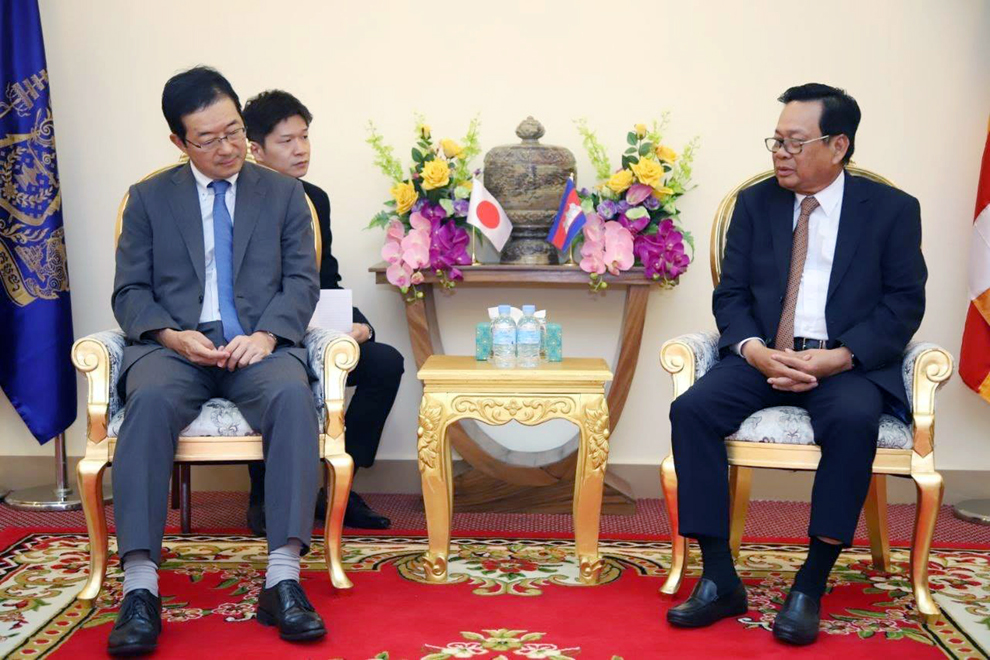
Minister of Labour and Vocational Training Ith Sam Heng (right) meets with Japanese ambassador Masahiro Mikami. Ministry of Labour and Vocational Training via facebook
The newly-appointed Japanese ambassador to Cambodia is committed to increasing the labour market for Cambodian trainees and skilled workers seeking employment in Japan, and is striving to streamline the form-filling process, Ministry of Labour and Vocational Training spokesman Heng Sour said on Monday.
Sour told reporters that ambassador Masahiro Mikami made his remarks during a meeting at the Ministry of Foreign Affairs and International Cooperation earlier in the day with Minister of Labour and Vocational Training Ith Sam Heng.
Sour said Japan would continue to open more job markets for Cambodian workers and provide opportunities for further training in the country.
As a result of legal reforms in Japan, he said, migrant workers seeking employment there were not required to have previous experience, and the length of contracts had increased.
“We have tried to reduce the time it takes to send workers to Japan and there is no longer a requirement for formal certification or work experience.
“This is a joint agreement between the two countries. We are working to make the application process shorter and make it easier for our citizens who wish to work there,” Sour said.
He said any potential trainee workers, whether they are currently employed or not, who have any qualifications and some knowledge of the Japanese language, can apply to work in Japan via an agency recognised by the ministry.
“Japanese employers will then come to interview them, and if they pass the interview, they will go to work in Japan. The ministry will help coordinate with the agencies, but the decision to recruit workers rests with the Japanese employers.
“Recruitment depends on those wishing to work there passing a test and an interview by potential employers,” Sour said.
The ministry’s Facebook page said ambassador Mikami had met with representatives of Japanese companies operating in Cambodia, such as Aeon, who had praised Cambodian employees’ hard work, patience and integrity.
“That is similar to employers and company representatives in Japan who have received Cambodian workers in their enterprises and are very satisfied with the work ethics of Cambodian trainees,” Mikami was quoted as saying.
In addition, the Facebook post said, the Japanese ambassador promised to further strengthen cooperation in the labour and vocational training sectors, whether in Japan or in Cambodia.
Sam Heng “expressed his full support for Japan’s commitment and said Cambodia is also satisfied with the working conditions of Japanese employers operating factories and enterprises in the Kingdom”, the ministry said on Facebook.
The minister said some 12,000 Cambodian trainees had been to Japan for internships, and last month the first 11 skilled workers had been sent there following the signing of a memorandum of understanding between the two countries.
Centre for Alliance of Labour and Human Rights executive director Moeun Tola said on Monday this was a good opportunity for Cambodian migrant workers to acquire other skills but they should be properly remunerated.
He said he also hoped the government would consider which skills would be most useful in the future, for example in electronics and agriculture.
“Trainees in Japan are required to work as general workers. We call them trainees but their working conditions are exactly the same as general workers, so they should be paid accordingly.
“I have seen an increase in electronics and bicycle factories in Cambodia. Cambodians should be sent to learn these skills. So in the future, when Japan opens these factories in Cambodia, we would already have skilled employees to do the work,” he said.














